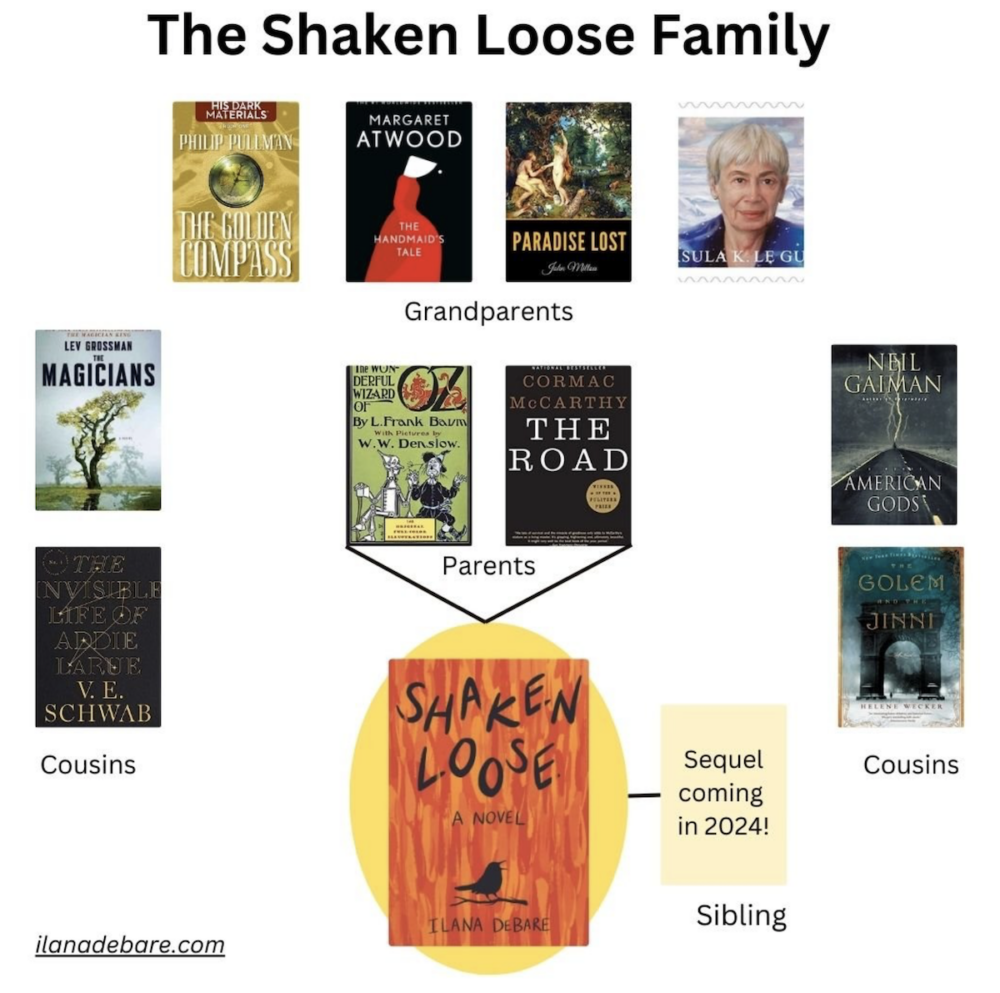
Today’s post is by author Ilana DeBare.
Choosing good comparable titles can be a brain-busting challenge for many writers. Comps let agents and publishers know where your book fits in the marketplace, and they’re helpful in crafting a publicity strategy. But it can be hard to find books that feel like an exact match, especially if you’re writing fiction and your novel doesn’t fit neatly into genre categories.
That was the case with Shaken Loose, my debut fantasy novel set in an unjust and unraveling Hell. During the long march to its recent publication, I came up with the idea of a Book Family Tree—an exercise that helped me better understand my own book and where it fit in the world.
It was not only enlightening but fun! So I made a free template that allows other writers to easily create family trees for their own books.
But first, some background.
While querying agents and publishers, I spent countless hours brainstorming potential comps while never feeling that any single one was a perfect match. Shaken Loose challenges organized religion like The Golden Compass, but it doesn’t have that book’s epic sweep; it features nuanced characters with existential dilemmas like The Golem and The Jinni but it isn’t historical fantasy. The landscape and backstory of its Hell are modeled on Paradise Lost, but clearly a 350-year-old poem isn’t a useful comp.
My book had an identity crisis. Or maybe the crisis was mine: I didn’t know where it belonged.
I’m a genealogy hobbyist as well as a writer, so I started playing around with the idea of creating a family tree for my book. If Shaken Loose had parents, who would they be? How about its grandparents? Its cousins?
This turned out to be a great deal of fun. It helped me think more broadly about the influences on my book and identify works that might not be an exact match but were still related.
With a family tree, I could list Paradise Lost as a grandparent—part of my book’s DNA, a foundational influence although vastly different in structure, perspective, and style. As parents, I chose an extremely odd couple—The Wizard of Oz and The Road—that expressed the book’s upbeat “quest for home” plot but also its vein of gritty darkness.

The “cousin” part of the tree was where I placed books that were actual comp candidates—recent upmarket fantasy like The Invisible Life of Addie LaRue. This was a reassuring way for me to think about comps: Cousins share a lot of traits, but no one expects them to be as similar as siblings. Certainly no one expects them to be identical twins.
I came away from this exercise with a better sense of where my book fit into the literary world. It helped me clarify the difference between influences and comps. And when publication day came, I felt like I had good answers if anyone asked me what books and writers had shaped my work.
To be clear: creating a book family tree isn’t a substitute for choosing one or two comps. Don’t try to send a family tree diagram to agents instead of a standard query letter! Nor will a family tree circumvent the task of identifying recent similar books in your genre. But if you’re feeling stymied, it may open up new ways of thinking about your work. And once you’re published, you can use it as a graphic in your marketing.
At the very least, you’ll have a colorful diagram to hang over your desk and remind you that—even if the world hasn’t recognized it yet—you’re a writer in a big, sprawling tradition of other writers.
The Book Family Tree template is available on Canva, a graphic design app with a robust and useful free version. Access it through my website. You’ll be prompted to create a free Canva account if you don’t have one already. Customize the template by uploading cover images of your chosen books, then download your finished diagram. (You can add or subtract “relatives” as you see fit.)
If you share your tree on social media, please tag me: I’d love to meet your family.


Ilana DeBare’s debut novel Shaken Loose was published in July 2023 by Hypatia Press. A former reporter for the San Francisco Chronicle, Ilana is also author of Where Girls Come First: The Rise, Fall, and Surprising Revival of Girls’ Schools (Tarcher/Penguin, 2004). She blogs at ilanadebare.substack.com and her web site is ilanadebare.com.

I love this!! What a helpful template.
What a great idea, Ilana. I wish I’d had the family tree concept when I was looking for comps for my novel. What I discovered in the process, though–that I think is similar to the principle of the “Family Tree”—was that the differences between my book and a possible comp mattered and could work for the comparison. (Does that make sense?) Thanks for this lovely, helpful post. I’m off to download the family tree on Canva. It’ll be an interesting exercise!
I love this idea. I’ve always done ‘family trees’ with my books but not in this way. It’s very clever. Thanks for this.
This is brilliant and it’s already helped me figure out some of my comps! Thank you, Jane, for all you do for the writing community.
The family tree idea makes the important “find comps” task FUN. For my upcoming book I placed Joseph Campbell’s Hero’s Journey as grandfather, and placing that book firmly in the past while honoring the linage was very helpful.